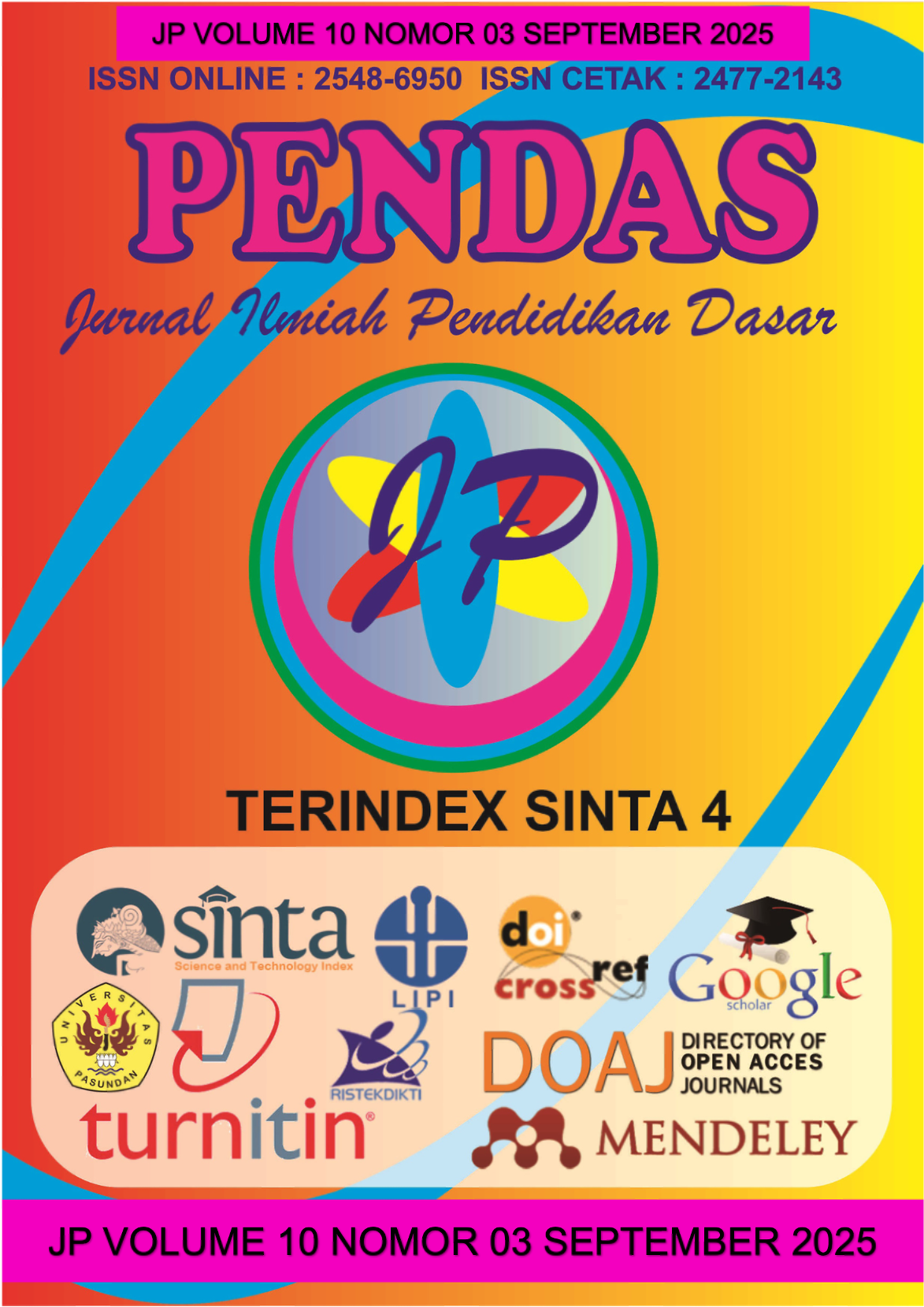PENGARUH MODEL PROBLEM BASED LEARNING (PBL) TERHADAP HASIL BELAJAR IPAS SISWA DI KELAS V SD NEGERI 21 SINGKAWANG
Penelitian Kuantitatif
DOI:
https://doi.org/10.23969/jp.v10i03.32446Keywords:
Problem-Based Learning (PBL), Learning Outcomes, Natural and Social Sciences, Elementary School, Pre-test, Post-test, Effect Size.Abstract
This study was motivated by the low learning outcomes of students in Natural and Social
Sciences (IPAS) in grade V of SD Negeri 21 Singkawang, which have not yet reached the
Learning Objective Achievement Criteria (KKTP). The objectives of this study are: 1) To
test whether there is a significant effect of the implementation of the Problem-Based
Learning (PBL) model on the learning outcomes of fifth-grade students at SDN 21
Singkawang in the subject of Natural and Social Sciences (IPAS). 2) To determine the extent
of the effect of using the Problem-Based Learning (PBL) model on the learning outcomes of
fifth-grade students at SDN 21 Singkawang in the subject of Natural and Social Sciences
(IPAS). This study uses a quantitative approach with an experimental research design,
specifically a Pre-Experimental Design of the One-Group Pretest-Posttest Design type. The
research subjects were 29 fifth-grade students at SDN 21 Singkawang. Data were collected
using a multiple-choice question technique consisting of 20 items. Data analysis included
normality tests using Chi-Square and hypothesis tests to determine the effect, as well as
Effect Size calculations to determine the magnitude of the effect. The results of the study
indicate that: 1) there is a significant difference between the pre-test and post-test scores
after the implementation of the PBL model. The One Sample T-Test shows a t-stat value of -
12.28, which is much greater than the critical t-value of 1.70, with a p-value of 1.4396 ×
10⁻¹², which is less than 0.05. This means that the null hypothesis is rejected and the
alternative hypothesis is accepted. 2) The calculation result of 0.64 indicates that the effect
of the PBL model on IPAS learning outcomes is in the large category
Downloads
References
Kemendikbudristek. (2022). Capaian Pembelajaran Mata Pelajaran Ilmu Pengetahuan Alam dan Sosial (IPAS) Fase A – Fase Cuntuk
SD/MI?Program Paket A. Diambil dari https://kurikulum.kemdikbud.go.id/file/cp/dasmen/13.%20CP%20IPAS.pdf
Meiza, A. (2023). Statistika Dasar Untuk Ilmu-Ilmu Sosial. Yogyakarta: Deepublish Digital. https://www.google.co.id/books/edition/Statistika_Dasar_Untuk_Ilmu_Ilmu_Sosial/dNo6EQAAQBAJ?hl=id&gbpv=1
Silvia, Ade Dian., Roshayanty, Fenny., & M, Ngurah Ayu Nyoman. (2023). Pengaruh Model Pembelajaran Problem Based Learning Tergadap Hasil Belajar IPAS Siswa Kelas IV SD Negeri Gayamsari 02. Didaktik: Jurnal Ilmiah PGSD STKIPSubang, 9(2), 4362-4370. https://journal.stkipsubang.ac.id/index.php/didaktik/article/view/1106
Pertiwi, S. (2019). Analisi Hasil Belajar Siswa Pada Pembelajaran IPA Menggunakan Model Pembelajaran Make A Match Di SD Negeri 83 Palembang. Scholastica Journal, 2(1), 144-153.
Subakti, H., Handayani, E. S. (2020) Pengaruh Bimbingan Belajar Terhadap Hasil Belajar Bahasa Indonesia Siswa Kelas Tinggi Di
Sekolah Dasar. Jurnal Basicedu, 5(1), 247-255. https://jbasic.org/index.php/basicedu/article/view/648
Suhelayanti dkk., (2022). Buku Referensi Pembelajaran Ilmu Pengetahuan Alam dan Sosial IPAS. https://www.google.com/url?
sa=t&source=web&rct=j&opi=89978449&url=https://repository.ung.ac.id/get/karyailmiah/10795/Buku-Referensi-Pembelajaran-Ilmu-Pengetahuan-Alamdan-Sosial-IPAS.pdf&ved=2ahUKEwjbz5i9wJeFAxXF1jgGHfU9D5AQFnoECA8QAQ&usg=AOvVaw1B8u8iSwsIQR59_uGq4bDo
Sugiyono. (2023). Metode Penelitian Kuantitatif Kualitatif dan R&D. Bandung: Alfabeta. 2(5); Sutopo, Ed.
Sunni, Ibrahim. (2022). Pengaruh Model Pembelajaran Problem Based Learning Terhadap Hasil Belajar IPS
Peserta Didik Kelas IV Di SD Negeri 1 Margoyoso. Bandar Lampung: Fakultas Tarbiyah dan Kependidikan Universitas Islam Negri Raden Intan Lampung. https://repository.radenintan
.ac.id/23720
Downloads
Published
Issue
Section
License
Copyright (c) 2025 Pendas : Jurnal Ilmiah Pendidikan Dasar

This work is licensed under a Creative Commons Attribution 4.0 International License.



















